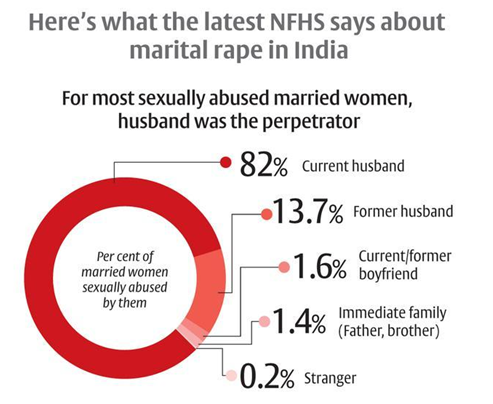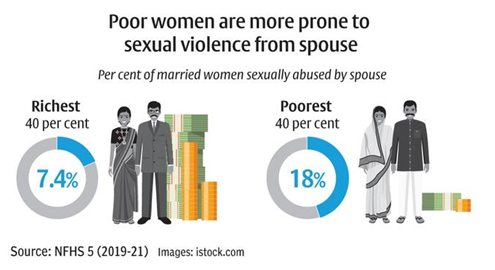Marital Rape
Context: The Supreme Court recently said that it will begin hearing a series of petitions seeking to criminalize marital rape from March 14.
What is Marital Rape?
- Marital rape refers to undesired intercourse by a man on his wife obtained by force, threat of force or physical violence or when she is unable to give consent.
Section 375 of the Indian Penal Code (IPC)
- Section 375 of the IPC mentions the acts that constitute rape by a man.
- The provision lays down two exceptions.
- It decriminalises marital rape
- It mentions that medical procedures or interventions shall not constitute rape.
Marital rape debates in India
- The Domestic Violence Act, 2005 implicitly states marital rape as any form of sexual abuse in a live-in or marriage relationship.
- Nonetheless, it only provides for civil remedies. There is no way for marital rape victims in India to initiate criminal proceedings against their perpetrator.
- The need to remove this marital rape exception was rejected by the Law Commission of India in 2000, while considering several proposals to reform India’s laws on sexual violence.
- Justice JS Verma Committee formed after December 2012 rape case gave some suggestions related to marital rape, but were not acted on.
- Stand of Legislature and Executive
- The topic has been brought up in Parliament as well. In a Parliament session in 2015, the then Minister of State for Home Affairs dismissed the idea of criminalizing marital rape by saying that marital rape cannot be applied in the country since marriage was treated as a sacrament or sacred in the Indian society.
- In 2017, the central government filed a testimony in the case, saying that criminalising marital rape may destabilise the institution of marriage and become a potential tool for harassing husbands.
- In January 2022 the Centre filed an additional affidavit in the case, saying that it can assist the Court only after consulting all stakeholders, including the state governments.
Judicial Pronouncement on the matter
- In May 2022 The Delhi High Court delivered a split verdict on decriminalising marital rape in the country.
- Justice Rajiv Shakdher struck down Exception 2 of the Indian Penal Code’s Section 375 that decriminalised rape within marriage.
- Justice C. Hari Shankar upheld its validity.
How did the exception on marital rape find its way into the IPC?
- The provision is based on the idea of implied consent which comes from the Doctrine of Hale.
- It states that a husband cannot be guilty of rape, since “by their mutual matrimonial consent and contract the wife has given up herself in this kind to the husband”.
- Another colonial-era convention that influenced the exceptional clause on marital rape has its roots in the Doctrine of Coverture. The Doctrine of Coverture states that a woman has no individual legal identity after marriage.
- Justice Indu Malhotra another case held that the doctrine is not recognised by the Constitution and is violative of her fundamental rights.
Marital rape treated around the globe
- According to Amnesty International data, 77 out of 185 (42%) nations criminalize marital rape through legislation.
- In other countries, it is either not mentioned or is explicitly excluded from rape laws, both of which can lead to sexual violence.
- Ten countries namely Ghana, India, Indonesia, Lesotho, Jordan, Nigeria, Oman, Singapore, Sri Lanka and Tanzania expressly allow marital rape of a woman or a girl by her husband.
- Seventy four countries allow women to file complaints against their husbands, 34 out of 185 do not provide any such provisions.
- About a dozen countries allow rapists to avoid prosecution by marrying their victims.
| Practice Question
● What are the social issues involved in criminalisation of Marital Rape?
|





